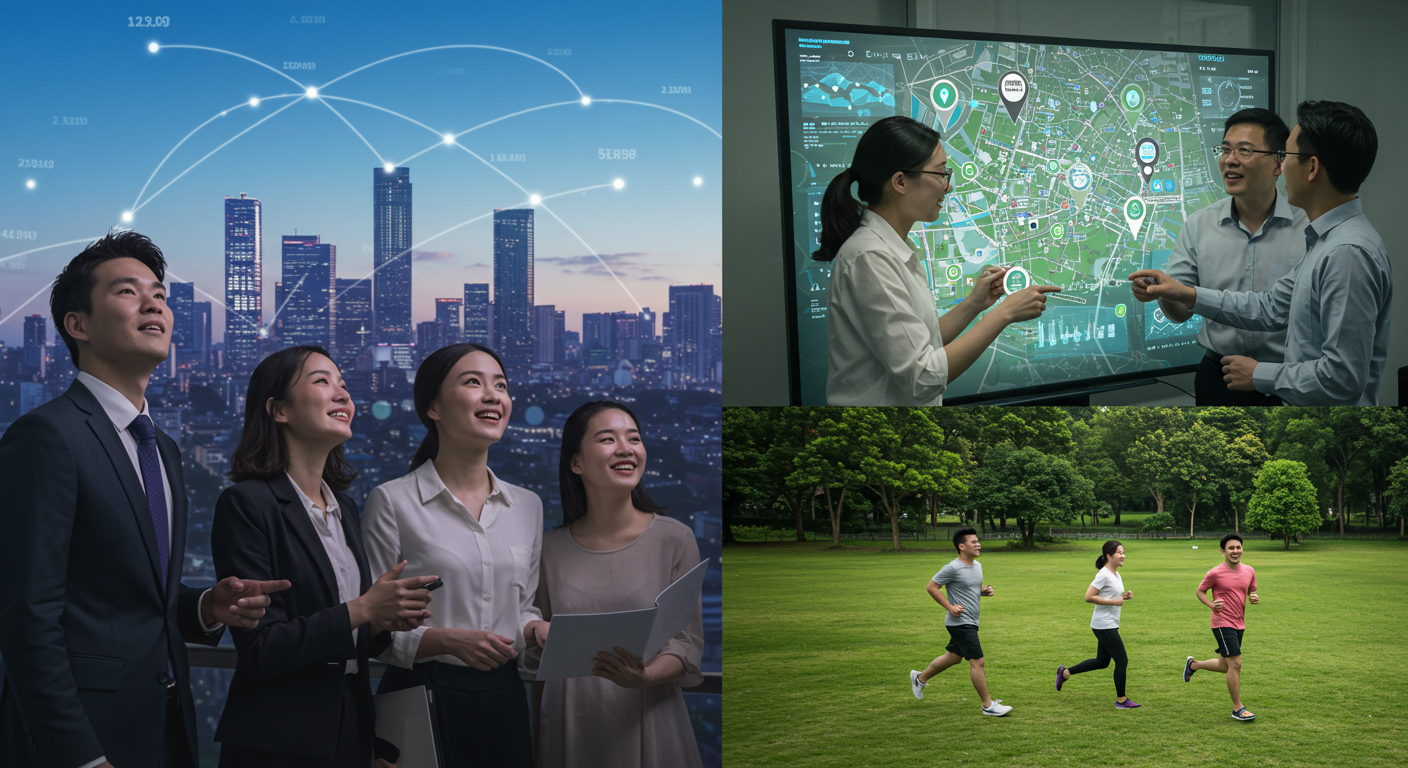The Future is Now: How Korea's Smart City Platform Became a Global Standard
The Future is Now: How Korea's Smart City Platform Became a Global Standard
Ever wonder what it truly takes to build an intelligent city, one that actually *works*? Beyond all the fancy gadgets and digital screens, it's about seamless management, right? Well, something pretty amazing just happened on the global stage, and it involves smart city tech developed right here at home!
Honestly, I’ve been fascinated by the idea of smart cities for years. The potential to transform urban living, making it more efficient and sustainable, always felt like a distant dream. But recently, a significant stride was made that brings this future much closer. The International Telecommunication Union (ITU) officially designated a domestic platform for smart city management as a global standard. This isn't just a technical formality; it's a huge endorsement that could redefine urban development worldwide. Let's dive into what this means for all of us.
Table of Contents
What Exactly is a Smart City Management Standard?
A smart city, at its core, uses technology to improve urban services and the quality of life for its residents. Think about it: smart traffic lights, real-time environmental monitoring, efficient waste management, and even connected public safety systems. But for all these disparate systems to work together, to truly create a cohesive urban experience, you need a common language, a set of rules. That’s where smart city management standards come in.
These standards are essentially guidelines that ensure different technologies, platforms, and data systems within a smart city can communicate and operate seamlessly. Without them, every city would be building its own unique, isolated ecosystem, which, honestly, sounds like a nightmare in terms of cost, scalability, and compatibility. I remember thinking how chaotic it could get if every city had its own unique system, like everyone speaking a different language at a global conference!
The International Telecommunication Union (ITU) plays a crucial role here. It's the United Nations specialized agency for information and communication technologies, and its job is to foster international cooperation and develop global standards across the tech landscape. When the ITU designates a standard, it's a big deal. It means that technology has been rigorously vetted and is deemed suitable for worldwide adoption and implementation. This isn't just about efficiency; it's about setting a foundation for a safer, more connected global future.
 Description : "A vibrant, futuristic cityscape illustration with glowing data lines connecting buildings and transportation. In the foreground, a diverse group of young professionals in business attire are looking up with expressions of awe and excitement. The style is modern and illustrative, with a purple-blue color scheme."
Description : "A vibrant, futuristic cityscape illustration with glowing data lines connecting buildings and transportation. In the foreground, a diverse group of young professionals in business attire are looking up with expressions of awe and excitement. The style is modern and illustrative, with a purple-blue color scheme."
Meet iClick: The Korean Platform Setting the Benchmark
So, who's the star of this show? It's a domestic platform for smart city management, known as iClick. While the details on iClick's specific functionalities aren't fully elaborated in the summary, we know it's a system that facilitates comprehensive smart city operations. This could include everything from data collection and analysis to managing various urban infrastructures and public services through a centralized hub.
On September 15th, a date that will probably be remembered in smart city circles, the ITU officially recognized iClick as a global standard. This means that iClick's architecture, its operational protocols, and its methods are now considered a best practice that other cities and countries can emulate. Honestly, when I first heard about a 'domestic platform' getting this kind of global nod, I felt a real sense of pride. It's not just about tech; it's about what we, as a nation, can achieve on the world stage.
This recognition speaks volumes about the innovation and foresight embedded in the platform. It suggests that iClick offers a robust, scalable, and adaptable solution to the complex challenges of urban management. It’s no small feat to have such a system accepted globally, implying a level of sophistication that genuinely stands out.
Why ITU Designation Matters for Smart Cities Globally
The ITU designation isn't just a badge of honor; it has profound implications for smart cities around the world. First off, it dramatically reduces the risk and cost for other cities wanting to implement smart technologies. Instead of starting from scratch or patching together incompatible systems, they now have a proven framework to follow.
This standardization also promotes innovation. With a common baseline, developers and tech companies can focus their efforts on creating new, complementary solutions that seamlessly integrate with the established standard, rather than reinventing the wheel. It fosters a competitive yet collaborative environment, which is always good for technological advancement.
Perhaps most importantly, it ensures compatibility and fosters trust. Citizens and businesses moving between cities will find similar, reliable services powered by these standards. It builds confidence in smart city initiatives, knowing they're built on a globally recognized and robust foundation. This isn't just a technical achievement; it's a huge step towards making our cities smarter and, dare I say, *happier* places to live, by creating dependable, interconnected urban environments.
 Description : "A diverse group of city planners and tech experts, men and women of various ages, gathered around a large interactive digital map displaying smart city data. They are engaged in a lively discussion, pointing at the screen with focused and collaborative expressions. The background shows a modern conference room with large windows, in a realistic photo style."
Description : "A diverse group of city planners and tech experts, men and women of various ages, gathered around a large interactive digital map displaying smart city data. They are engaged in a lively discussion, pointing at the screen with focused and collaborative expressions. The background shows a modern conference room with large windows, in a realistic photo style."
The Impact: A Glimpse into Future Urban Living
What does this global standard actually mean for you and me, the everyday citizens? Imagine a city where your morning commute is consistently smooth because traffic patterns are optimized in real-time. Where environmental sensors provide granular data, leading to cleaner air and more effective urban planning. Or a city where public safety is enhanced through proactive monitoring and rapid response systems.
This standardization also helps prevent what I like to call "fragmented development." You know, when different parts of a city implement smart solutions that don't talk to each other? It's inefficient and ultimately limits the true potential of a smart city. With a global standard, cities can build from a unified blueprint, ensuring that every new piece of technology contributes to a larger, more intelligent whole.
The promise here is not just about convenience; it's about creating genuinely more livable, sustainable, and resilient urban environments. A standardized approach means that the best practices for managing city infrastructure, resources, and services can be shared and adopted more easily, making the benefits accessible to more people around the globe. That's the real power of a global standard in smart city management.
What's Next for Global Smart City Standards?
This ITU designation is undoubtedly a major milestone, but it's really just the beginning of a larger journey. With a global standard now in place, we can expect to see an accelerated pace of smart city development worldwide. More cities will likely adopt platforms compliant with this standard, leading to a much more interconnected global urban fabric.
Korea, having championed this platform to global standard status, is now uniquely positioned to continue its leadership in the smart city domain. This could involve further enhancements to iClick, collaborations with other nations to implement the standard, or even the development of new, complementary technologies that build upon this foundation. It's an exciting time, to say the least. We're on the cusp of truly integrated, intelligent urban environments, and it feels like we're just getting started. The role of other nations and tech companies in adopting and expanding on this standard will be critical in shaping how our cities evolve in the coming years.
 Description : "An aerial view of a bustling, eco-friendly smart city at dusk, with self-driving cars on illuminated roads and green spaces. Data visualizations subtly overlay the scene, depicting efficiency and connectivity. The atmosphere is calm yet dynamic, with a slightly stylized, cinematic photo aesthetic."
Description : "An aerial view of a bustling, eco-friendly smart city at dusk, with self-driving cars on illuminated roads and green spaces. Data visualizations subtly overlay the scene, depicting efficiency and connectivity. The atmosphere is calm yet dynamic, with a slightly stylized, cinematic photo aesthetic."
FAQs: Your Questions About Smart City Standards Answered
The ITU is a specialized agency of the United Nations responsible for matters related to information and communication technologies. It works to connect the world, manage the global radio-frequency spectrum, develop technical standards, and improve infrastructure in the developing world.
A global standard ensures interoperability between different smart city technologies and systems. It reduces development costs, promotes innovation, and allows for the easy adoption of proven solutions worldwide, ultimately leading to more efficient and reliable urban services.
Citizens benefit from improved urban services like smarter traffic management, better environmental monitoring, enhanced public safety, and more efficient resource allocation. A standardized approach helps create more livable, sustainable, and responsive cities.
While not mandatory, an ITU global standard offers a strong incentive for cities to adopt it due to the proven benefits in cost-efficiency, interoperability, and reliability. It's expected to be widely adopted, especially by cities looking to develop or upgrade their smart city infrastructure.
iClick is a domestic platform for smart city management from Korea that has been designated as a global standard by the ITU. It provides comprehensive solutions for managing various aspects of urban operations and services.
 Description : "A close-up shot of hands, one holding a tablet displaying smart city metrics and the other gesturing thoughtfully, during a collaborative discussion. The background is slightly blurred, showing modern office equipment and perhaps a city skyline. The mood is professional and innovative, in a high-definition photo style."
Description : "A close-up shot of hands, one holding a tablet displaying smart city metrics and the other gesturing thoughtfully, during a collaborative discussion. The background is slightly blurred, showing modern office equipment and perhaps a city skyline. The mood is professional and innovative, in a high-definition photo style."
Embracing a Smarter Tomorrow, Together
The ITU's designation of Korea's smart city management platform as a global standard isn't just a win for one country or one piece of technology. It's a win for urban development worldwide, paving the way for more integrated, efficient, and livable cities for everyone. It's truly inspiring to see how far we've come in making our urban environments smarter, and I can't wait to see what smart cities will look like in another decade or so. The future is definitely exciting, and it feels like we're just getting started on this incredible journey.
What are your thoughts on this? Do you think global standards are the key to truly smart cities, or are there other factors at play? Share your perspective in the comments below! I'd love to hear what you think.
[1] Original source for ITU designation: Korea.net NewsFocus on Sci-Tech.
Comments
Post a Comment